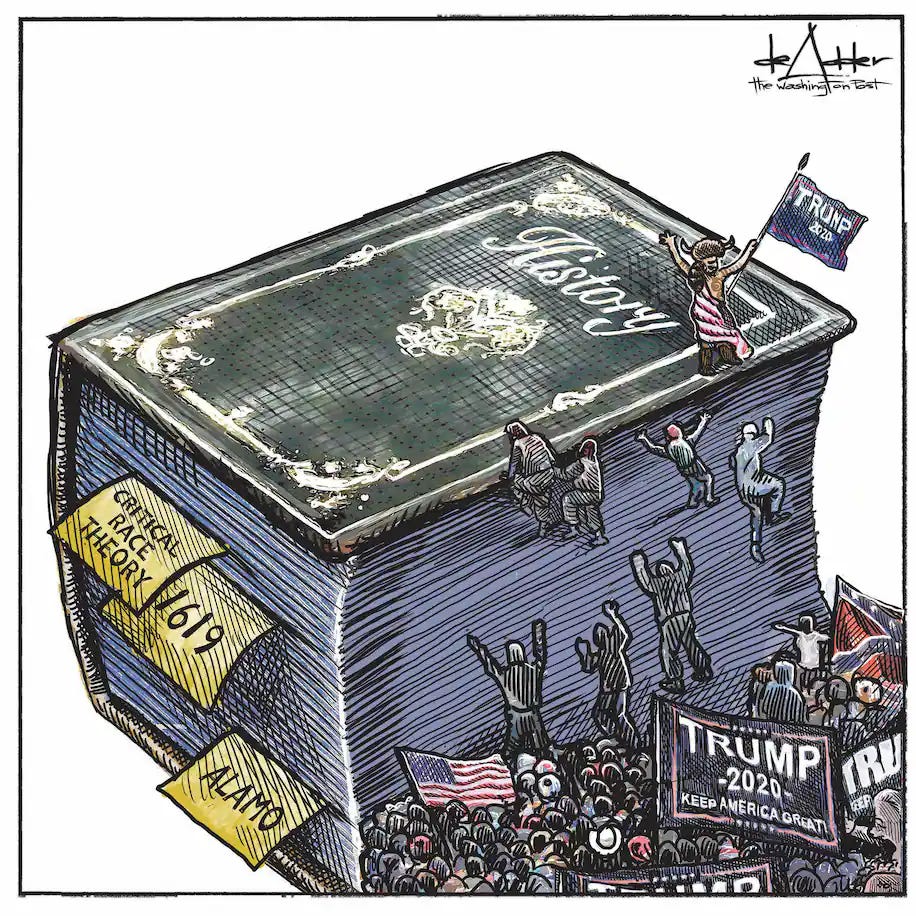Was 'Summer of Soul' Footage Really 'Locked in a Basement for 50 Years'?
A film archivist/director has challenged a widely-publicized claim about the excellent new Questlove documentary.
A special edition follows, related to the fine new Questlove doc, Summer of Soul, which we previewed here three times going back to its Sundance unveiling, and now released to theaters and via Hulu. It deserves acclaim, but now there is a bit of controversy over excessive claims by journalists, and Questlove himself, that the footage of the 1969 Harlem Cultural Festival was “lost” and/or buried in some basement for half a century. We explore that below, with much original reporting, plus present some of the “lost” performances not in the film that have, it turns out, been available via YouTube and other sources for many years. (Note: Several key additions below based on new research since first posted.) But first, our usual cartoon, and then don’t forget to share, comment, tweet, and please subscribe (it’s free)!
Is a ‘Soul’ Credit Missing?
I had planned to simply offer a few great videos today of artists in the The Summer of Soul (e.g. Nina Simone and the Staples) that some people out there might not be that familiar with, from elsewhere in their careers. But a Facebook post by Joe Lauro on Tuesday, which revealed that some of the performances from the fest have long been available, led me to a quick—and by no means exhaustive—search of YouTube that yielded a few numbers, even the complete volcanic set by Sly and the Family Stone. And some further digging that puts the film’s origin story in question, including the fact that at least two Academy Award-winning directors were involved years ago with the footage—and trying to bring it the screen.
So, for starters, here’s one song not in the film from Nina Simone, posted on YouTube in 2013. If you’ve seen the doc, you will immediately recognize the stage backdrop and the crowd scene. Apparently her “Young, Gifted and Black,” which is in doc, was up on YouTube long ago and drew wide views until removed. And part or her reading of an incendiary David Nelson poem on stage as a kind of climax for Summer of a Soul appeared a few years ago in the acclaimed doc, What Happened, Miss Simone?
So now, below, is Joe Lauro, founder of the Historic Films archive out on Long Island (still very much in operation), in his Facebook post, which I have trimmed somewhat. Lauro, among other credits, recently directed a fine Fats Domino doc shown on PBS’s American Masters. I’m not sure why he did not post something sooner, as the press has heavily promoted this film for months, with very wide coverage in the past week or so. Also, I have not yet seen a response by Questlove and others behind the film, which I will post if and when it arrives.
Lauro may have decided to speak out after Questlove (Ahmir Thompson) was quoted in the NY Times claiming in regard to footage from the festival: “For nearly 50 years, this just sat in a basement and no one cared.” Also, Questlove said he had “looked it up online. It’s not on the internet….” Lauro’s response, in part:
This statement [by Questlove] at best is hyperbole. The reality is that in 2004 I tracked down director/producer Hal Tulchin after screening a 16mm syndication print…Mr. Tulchin and I went to lunch to discuss the Harlem Festival footage and shortly thereafter he signed a representational agreement with my company Historic Films. The idea was to license clips to third parties from the 40+ hours of Harlem Festival footage as well as develop a feature length documentary on the event.
I pulled the video tape masters from his Westchester County basement, digitized the reels, logged their contents, archived the submasters at the Historic Films offices and insisted that Mr. Tulchin copyright all of the reels. In fact I filled out the forms for him and filed the copyright registration on his behalf ( and on my dime) with the Library Of Congress… Through the years of our representation, we licensed excerpts of the footage to several productions including SONY RECORDS who used a sizable portion of the “lost” Nina Simone set in one of their home video releases.
Morgan Neville ( Academy Award Winning director TWENTY FEET FROM STARDOM) Robert Gordon (Emmy winning co-director BEST OF ENEMIES) and I developed a feature length documentary film on the festival framing the event within the politics and civil right unrest that existed at the time, created a trailer and shopped the production around to several possible distributors. A deal with a major distributor was in negotiation in 2007 and we were in contract negotiations. To our surprise the negotiations broke down and the rep from that company jumped ship and teamed with Mr. Tulchin dumping Neville, Gordon and myself taking the Harlem Festival project on as his own….
As an archivist and filmmaker who has spent his 35 year career creating music documentaries, and unearthing and preserving rare musical content, I am delighted that this film has finally been produced. I only ask that credit for the Harlem Festival footages' re-discovery be properly given. Producers of a doc such as this that is touting it’s righteousness and quest for truth should at least give credit where it is due. I assure you, if it were not for my efforts the Harlem Festival master tapes would likely still be molding in Mr. Tulchin’s Westchester County basement and Questlove would still be in total ignorance of their existence.
Here, for example, is Sly’s “Everyday People,” which is in the film but also on YouTube since 2018. Below that—Sly’s entire set, up on YouTube for at least the past year.
An article in Smithsonian magazine—in 2007—seems to support Lauro’s contentions, including his own plans for a documentary with Morgan Neville way back when. A NY Times obit for Hal Tulchin in 2017 included this: “One of the few people who have seen all the footage is Joe Lauro, the president of Historic Films, an archive of music and entertainment film that restored, digitized and licensed Mr. Tulchin’s tapes for a while.” And Rolling Stone in 2019: “Then, towards the end of his life, Tulchin considered a series of offers with acclaimed filmmakers like Alex Gibney and Robert Gordon. But for a variety of financial, creative, and personal reasons, Tulchin, to the frustration of everyone around him, backed out of the deals at the last minute.”
One issue that never shows up in reports on why it took so long to get a film produced—and not simply “no one was interested in this festival”—was that Tulchin had secured no feature film clearances from the many, many, performers, an enormous, time-consuming and costly process.
Now, there is no doubt that Questlove made the film happen at last—and did a terrific job in his choice of songs, new interviews, and framing of the festival’s importance. That’s not disputed. And no one doubts that the vast majority of footage has never been shown until now—but there were several prominent local and national TV airings in 1969.
A one-hour CBS special was telecast that summer on July 28 which, in those limited TV option days, must have drawn viewership in the many millions if national and not merely New York regional, as its competition was only the Dick Cavett Show on ABC and a minor NBC movie. (H/t my old colleague Stephen Battaglio for the graphic below, a good-sized ad which ran in the NY Times and probably elsewhere).
ABC also aired a one-hour primetime special on part of the fest that September 16, featuring footage from the event for, among others, the Staples Singers, Mahalia Jackson, Jesse Jackson and Ben Branch, and hosted by the festival organizer Tony Lawrence.
In any event, the networks along with Maxwell House funded the fest to the tune of $250,000, a whopping sum then.
But as a doc director myself (my current award-winning Atomic Cover-up), and longtime Crawdaddy editor, I am, of course, especially interested in any responses from the Questlove side to all of this, and credit for, Lauro. And, of course, the many journos who failed to do proper fact-checking—if indeed Lauro’s story pans out—also deserve scrutiny. Typical was this from Rolling Stone: “Hal Tulchin filmed the 1969 concerts with a professional crew, but the footage would end up sitting in his basement in suburban Westchester for nearly 50 years.” NPR went further in claiming the footage was not just stored in the basement but “locked” up tight: “Footage of the festival had been locked in a basement for 50 years.”
Note that the subtitle for the film is: “or, When the Revolution Could Not Be Televised.”
Meanwhile, enjoy the Questlove flick that has emerged, and below, three more allegedly “lost” songs from the festival, from Nina Simone at You Tube (“Revolution,” up since 2019), Glady Knights and the Pips’ “I Wish It Would Rain” (posted since 2015), and from Ray Baretto (with a note that it comes from a 2005 VHS). And if you appreciate this post—please subscribe, it’s still free, and you’ll get “music & politics” in your email box almost every day.
Film/TV
First teaser for Succession, coming this autumn, has just dropped….
Greg Mitchell is the author of a dozen books, including the bestseller The Tunnels (on escapes under the Berlin Wall), the current The Beginning or the End (on MGM’s wild atomic bomb movie), and The Campaign of the Century (on Upton Sinclair’s left-wing race for governor of California), which was recently picked by the Wall St. Journal as one of five greatest books ever about an election. His new film, Atomic Cover-up, just had its world premiere and is drawing extraordinary acclaim. For nearly all of the 1970s he was the #2 editor at the legendary Crawdaddy. Later he served as longtime editor of Editor & Publisher magazine. He recently co-produced a film about Beethoven’s Ninth Symphony.






I wanted what you wrote to be wrong. But you are correct There are others videos from that fest. But not Disney is block those. I am going to guess people abroad did get rights to parts of the film.
what this means to me, is we will never see the entire thing. I did see see parts of the sly acts. Looking at those shows me they are going to cut it up in sections, so they can squeeze out every little dime out of it. Cause its almost all profit.
I’ve been a victim of ruthless sketchy promotion teams. Unfortunately, in the entertainment world, many look at it like “all’s fair in love and war”. I’ve seen a broken man whose song he sent for consideration to an artist who ripped it off and it became #1 for the artist. The regular Joe proved it to me it was his with metadata dates on computer files. He tried to fight with a lawyer who was then overwhelmed by the major label big boys. Guy died a broken man. I tried to keep his spirits up. So sad.